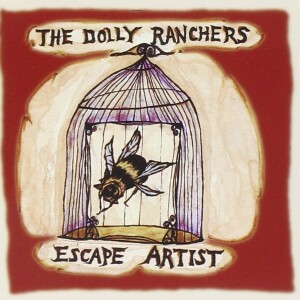 Vocal harmony has always played a leading role in country music. Today’s alternative country and country folk music continues to draw on that tradition, as we see in this recording from The Dolly Ranchers. This Santa Fe, New Mexico based female quartet’s music revolves around the harmonies of two lead singers. Amy Bertucci usually takes the low parts and Sarah-Jane Moody the high. Moody also contributes Dylan-esque harmonica, rhythm guitar and hand percussion. Rounding out the quartet are Maria Fabulosa on bass and chief songwriter Marisa Anderson on guitar and banjo.
Vocal harmony has always played a leading role in country music. Today’s alternative country and country folk music continues to draw on that tradition, as we see in this recording from The Dolly Ranchers. This Santa Fe, New Mexico based female quartet’s music revolves around the harmonies of two lead singers. Amy Bertucci usually takes the low parts and Sarah-Jane Moody the high. Moody also contributes Dylan-esque harmonica, rhythm guitar and hand percussion. Rounding out the quartet are Maria Fabulosa on bass and chief songwriter Marisa Anderson on guitar and banjo.
The Ranchers set their and poetic lyrics against generally sparse, bluegrass-influenced arrangements. That their only cover here is by Hazel Dickens, one of the first and certainly most prominent of female bluegrass vocalists, reveals much about their leanings, both musically and philosophically; the song is “Don’t Put Her Down, You Helped Put Her There,” a scathing indictment of a male-dominated society that creates a market for prostitutes but treats them as scum and criminals.
For the most part, though, Escape Artist is concerned more with the difficulties of maintaining relationships while living the life of a traveling musician. Among the best are Anderson’s “Driving” and Bertucci’s “Tail Lights,” which offer the two women’s different takes on the theme. Anderson’s is a shotgun-blast of words and images: “I dream of driving at night/the neon light the double yellow/dotted lines and highway signs/all drifting by/this life of mine,” while Bertucci’s is more metered and stark: “Over the icy bridge you roll away slow/until the line of trees and I watch you go.”
Moody’s songs allow her to highlight her high, feathery voice, heard to good effect on the neo-traditional “Maddie Girl Slim.” “When you kiss me in the morning/it interrupts my longing for the travel.” When Moody takes the lead, Bertucci’s vulnerable alto anchors Moody’s quavering high notes.
The two sing tighter, closer harmonies on “Cholula,” a shambling Southwestern-style waltz with harmonica and accordion wailing forlornly behind the hushed lyrics about “love on the side.”
And Moody sometimes sings tight harmony, sometimes echoes each line, in the pensive, folky “Carry Me Home.” The two swap roles, Bertucci supplying high harmony behind Moody’s lead on the jazzy, finger-snapping “Train Bridge,” as well as on the aforementioned “Driving.”
Add Johnny Cash to the musical and spiritual influences on the Ranchers, as evidenced by “WWJCD (What Would Johnny Cash Do),” co-written by Anderson and Moody, and quoting liberally from Cash’s canon.
The Dolly Ranchers are well worth checking out for a unique take on highly harmonized country folk with an old-time sound and modern sensibility.
(Chaos Kitchen, 2002)
